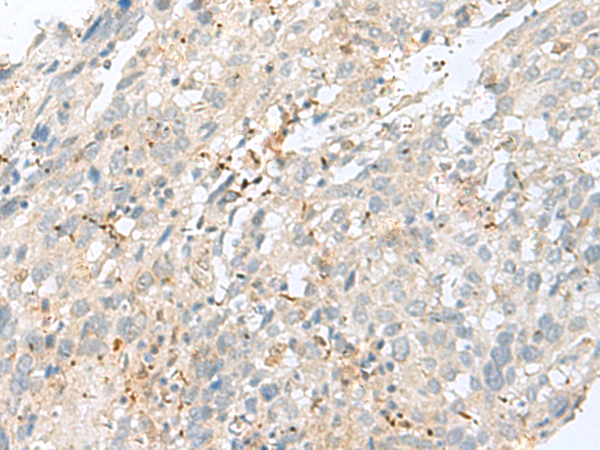
| WB | 咨询技术 | Human,Mouse,Rat |
| IF | 咨询技术 | Human,Mouse,Rat |
| IHC | 1/40-1/200 | Human,Mouse,Rat |
| ICC | 技术咨询 | Human,Mouse,Rat |
| FCM | 咨询技术 | Human,Mouse,Rat |
| Elisa | 1/5000-1/10000 | Human,Mouse,Rat |
| Aliases | TPMTD |
| Host/Isotype | Rabbit IgG |
| Antibody Type | Primary antibody |
| Storage | Store at 4°C short term. Aliquot and store at -20°C long term. Avoid freeze/thaw cycles. |
| Species Reactivity | Human |
| Immunogen | Fusion protein of human TPMT |
| Formulation | Purified antibody in PBS with 0.05% sodium azide and 50% glycerol. |
+ +
以下是关于TPMT抗体的3篇代表性文献,简要总结其内容:
---
1. **文献名称**:*Molecular diagnosis of thiopurine S-methyltransferase deficiency: genetic basis for azathioprine and mercaptopurine intolerance*
**作者**:Honchel, R., Aksoy, I., Szumlanski, C., Weinshilboum, R.
**摘要**:该研究探讨了TPMT酶缺乏的分子诊断方法,通过检测TPMT基因突变预测患者对硫嘌呤类药物的不耐受性。文中提到利用抗TPMT的抗体进行蛋白定量分析,以验证基因型与酶活性之间的相关性。
---
2. **文献名称**:*Thiopurine methyltransferase activity in human erythrocytes: a new HPLC method using a specific monoclonal antibody*
**作者**:Dervieux, T., Blanco, J.G., Krynetski, E.Y., et al.
**摘要**:作者开发了一种基于高效液相色谱(HPLC)和单克隆抗体的新方法,用于精确测量红细胞中TPMT酶活性。研究强调该抗体在特异性捕获TPMT蛋白并提高检测灵敏度中的关键作用。
---
3. **文献名称**:*Autoantibodies against TPMT as a novel biomarker in autoimmune diseases: prevalence and clinical associations*
**作者**:Roberts, R.L., Gearry, R.B., Barclay, M.L., et al.
**摘要**:该研究首次报道了自身免疫疾病患者体内存在抗TPMT抗体,分析了这些抗体在类风湿性关节炎和炎症性肠病中的流行率,并探讨其与硫嘌呤治疗耐药性的潜在关联。
---
**备注**:TPMT抗体相关研究多集中于酶活性检测方法的开发(如ELISA、HPLC结合抗体技术)及自身免疫疾病中的新发现。早期文献侧重基因型-表型关联,近年研究则扩展至抗体作为诊断工具或病理标志物的应用。
The thiopurine S-methyltransferase (TPMT) antibody is associated with the detection or study of TPMT, an enzyme critical in metabolizing thiopurine drugs like azathioprine, 6-mercaptopurine, and 6-thioguanine. These drugs are used to treat autoimmune disorders, inflammatory bowel disease, and leukemia. TPMT catalyzes the methylation of thiopurines, influencing their efficacy and toxicity. Genetic polymorphisms in the TPMT gene can lead to variable enzyme activity: individuals with low or absent TPMT activity are at high risk of severe myelosuppression due to drug accumulation.
Anti-TPMT antibodies are not typically part of routine clinical testing but may be researched in autoimmune contexts. In rare cases, autoantibodies against TPMT have been reported, potentially interfering with enzyme function or diagnostic assays. For example, in autoimmune hepatitis or lupus, such antibodies might contribute to altered drug metabolism or misinterpretation of TPMT activity levels. However, standard practice focuses on TPMT genotyping or phenotyping (enzyme activity measurement) to guide dosing, rather than antibody detection. Research on TPMT antibodies remains niche, exploring their role in drug resistance, assay interference, or autoimmune mechanisms. Clinically, understanding TPMT variability remains pivotal to personalize thiopurine therapy and minimize adverse effects.
×